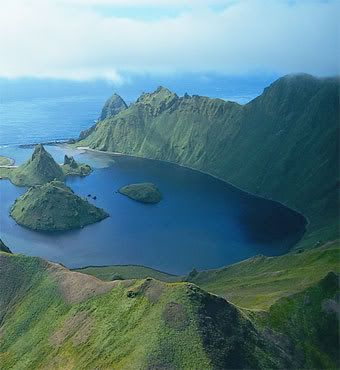A jaw-dropping moment really can make time appear to stand still - or at least slow down, new research suggests.
Regular "awesome" experiences may also improve our mental health and make us nicer people, claim psychologists.
The findings raise the prospect of "awe therapy" to overcome the stressful effects of fast-paced modern life.
Awe is the emotion felt when encountering something so vast and overwhelming it alters one's mental perspective.
Examples might include experiencing a breathtaking view of the Grand Canyon, taking in the ethereal beauty of the Northern Lights, or becoming lost in a dazzling display of stars on a clear, dark night.
The new research found that by fixing the mind to the present moment, awe seems to slow down perceived time.
Studies on groups of volunteers showed that experiencing awe made people feel they had more time to spare.
This in turn led them to be more patient, less materialistic, and more willing to give up time to help others.
Writing in the journal Psychological Science, the scientists led by Melanie Rudd, from Stanford University in California, concluded: "People increasingly report feeling time-starved, which exacts a toll on health and wellbeing.
"Drawing on research showing that being in the present moment elongates time perception, we predicted and found that experiencing awe, relative to other states, caused people to perceive they have more time available and lessened impatience.
"Furthermore, by altering time perception, feeling awe led participants to more strongly desire to spend time helping others and partake in experiential goods over material ones.
"A small dose of awe even gave participants a momentary boost in life satisfaction. Thus, these results also have implications for how people spend their time, and underscore the importance and promise of cultivating awe in everyday life."
The researchers conducted a series of experiments to compare the effects of awe and happiness.
One involved volunteers watching either an "awesome" video depicting ordinary people in city streets and parks encountering "vast, mentally overwhelming and seemingly realistic images" such as waterfalls, whales and astronauts in space.
Another "happiness" video showed rainbow-coloured confetti falling through the air and a parade of smiling, joyful people wearing brightly coloured outfits and waving flags.
In other experiments, participants wrote about memories of awesome or happy experiences, and read a story about climbing the Eiffel tower and looking down on Paris.
Previous studies have linked "lack of time" feelings with an increased risk of high blood pressure as well as headaches, stomach pains and poor sleep quality.
Time pressure is also linked to eating unhealthy fast-food diet, failing to engage in leisure experiences, and depression.
The researches added: "Our studies... demonstrated that awe can be elicited by a walk down memory lane, brief story, or even a 60-second commercial.
"Therefore, awe-eliciting experiences might offer one effective solution to the feelings of time-starvation that plague so many people in modern life."
Source: danschultzphoto
The findings raise the prospect of "awe therapy" to overcome the stressful effects of fast-paced modern life.
Awe is the emotion felt when encountering something so vast and overwhelming it alters one's mental perspective.
Examples might include experiencing a breathtaking view of the Grand Canyon, taking in the ethereal beauty of the Northern Lights, or becoming lost in a dazzling display of stars on a clear, dark night.
The new research found that by fixing the mind to the present moment, awe seems to slow down perceived time.
Studies on groups of volunteers showed that experiencing awe made people feel they had more time to spare.
This in turn led them to be more patient, less materialistic, and more willing to give up time to help others.
Writing in the journal Psychological Science, the scientists led by Melanie Rudd, from Stanford University in California, concluded: "People increasingly report feeling time-starved, which exacts a toll on health and wellbeing.
"Drawing on research showing that being in the present moment elongates time perception, we predicted and found that experiencing awe, relative to other states, caused people to perceive they have more time available and lessened impatience.
"Furthermore, by altering time perception, feeling awe led participants to more strongly desire to spend time helping others and partake in experiential goods over material ones.
"A small dose of awe even gave participants a momentary boost in life satisfaction. Thus, these results also have implications for how people spend their time, and underscore the importance and promise of cultivating awe in everyday life."
The researchers conducted a series of experiments to compare the effects of awe and happiness.
One involved volunteers watching either an "awesome" video depicting ordinary people in city streets and parks encountering "vast, mentally overwhelming and seemingly realistic images" such as waterfalls, whales and astronauts in space.
Another "happiness" video showed rainbow-coloured confetti falling through the air and a parade of smiling, joyful people wearing brightly coloured outfits and waving flags.
In other experiments, participants wrote about memories of awesome or happy experiences, and read a story about climbing the Eiffel tower and looking down on Paris.
Previous studies have linked "lack of time" feelings with an increased risk of high blood pressure as well as headaches, stomach pains and poor sleep quality.
Time pressure is also linked to eating unhealthy fast-food diet, failing to engage in leisure experiences, and depression.
The researches added: "Our studies... demonstrated that awe can be elicited by a walk down memory lane, brief story, or even a 60-second commercial.
"Therefore, awe-eliciting experiences might offer one effective solution to the feelings of time-starvation that plague so many people in modern life."
Source: danschultzphoto
Source:
Awe therapy could 'improve our mental health and make us nicer' - Middle East - World - The Independent
LINK:
http://www.independent.co.uk/news/world/middle-east/awe-therapy-could-improve-our-mental-health-and-make-us-nicer-7964858.html#


No comments:
Post a Comment